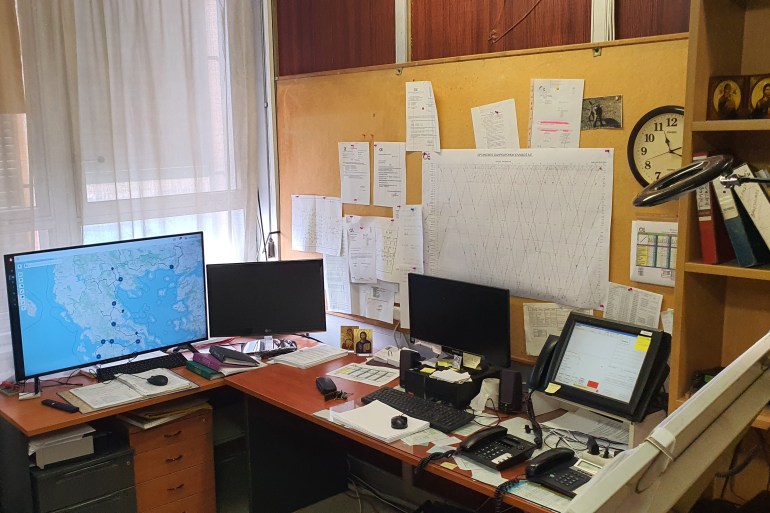Greek parties bleed votes between a train disaster and election
Athens, Greece – Anastasia Adamidi’s fellow students describe her as a brilliant young woman.
The 24-year-old dentistry postgraduate student from Cyprus was heading to the Aristotelian University of Thessaloniki late on February 28. She was to start her second semester on March 6.
But her family held her funeral on that day instead, and the department of prosthetic dentistry cancelled the day’s lessons.
Adamidou was one of 57 people killed when her passenger train collided head-on with a freight train at a combined speed of 280km/h in Greece’s worst-ever train accident.
“Part of her degree was to monitor undergraduates, and it’s no coincidence that everybody has something good to say about her,” said Thanos Venetis, a fellow doctoral student.
“She was always doing something for someone with a smile on her face. She was an excellent colleague, the type of colleague everyone would like to have,” he told Al Jazeera.
A photograph her family gave the media showed a smiling brunette in a powder blue suit and subfusc on her Bachelor’s degree graduation day.

Outside the laboratory where Adamidi had worked, people left flowers. Someone pinned up her picture.
“In memory of the tragic loss of Anastasia Adamidi, who was taken so young, we inform you that scheduled lessons in prosthetics, clinical practice and laboratory work on Monday 6 March will not take place,” her department announced.
The train disaster, and the fact that many young people were killed in it, has stirred Greeks to look for political culprits beyond the Larissa stationmaster who, according to leaked testimony, confessed to mistakenly sending the northbound passenger train up the southbound track.
Several opinion polls now show that the governing conservative New Democracy party has lost four points in advance of an election that must come by July, upending its expectations of a second term of single-party rule.
New Democracy has now said it will make sure there are two stationmasters on every shift when rail services resume on March 22.
Public hiring
Through a fast-track process that bypassed the normal state evaluation process through the Supreme Council for Personnel Selection, New Democracy hired 73 stationmasters, including the confessed culprit.
“That’s unacceptable,” said Christos Retsinas, a former head of safety for the Hellenic Railways Organisation’s subsidiary, Hellenic Train, which operates the rolling stock.
“The excuse was that the Supreme Council takes too long. The fact is, you only go through this fast-track process if you’re doing political favours,” Retsinas told Al Jazeera.
“They also put them through a curtailed training – four months of theory and a month of practice … they haven’t been trained properly. And then the selection committee passed all of them. Wasn’t there a single person who didn’t qualify? I’ve never heard of such a thing.”
He believed it would have been safer and just as fast to temporarily re-hire retired stationmasters.
The government has dwelled on the fact that the Larissa stationmaster failed to use an automated route selection system installed at the station last November, which would have prevented the accident by re-setting the switches automatically. But it has not commented on the hiring or training process that led to this failure.
Safety systems
There is also major political responsibility in Greece’s failure to install the full set of automated safety equipment mandated by EU law throughout the country.
The route selection subsystem is only a part of that equipment, known as the European Train Control System (ETCS), which also includes train monitoring, automatic signalling, speed control and emergency braking mechanisms.
Larissa was one of 16 stations where ETCS work remained to be done because successive governments had failed to fulfil a 2014 contract to install ETCS nationwide.
This practically meant that only the Larissa stationmaster could see the passenger train heading up the wrong track. Hellenic Train, which operated train 62, could only see its position on a GPS screen, but not its speed, direction or track.
Hellenic Railways Organisation (OSE), the state owner of rail infrastructure responsible for the track and stations, has a national traffic coordinator who also could not see what was going on.

Al Jazeera was granted access to Room 617 in OSE’s city block-sized building, where the traffic coordinator sits. He is able to talk to train drivers and stationmasters on a VHF radio and plot trains’ progress on a paper chart, but has no information besides what he is given.
The ETCS would have given him the ability to independently question what train 62 was doing.
The opposition Radical Left Coalition (Syriza), in power from 2015 to 2019, has deflected blame for the non-fulfilment of the ETCS contract to New Democracy, saying it left office with the contract 68 percent complete. New Democracy has denied that.
“When work stopped in 2017, automated signalling and monitoring had been delivered to 17 out of 52 [nationwide] stations,” said minister without portfolio Yiorgos Gerapetritis, who has temporarily taken over the transport ministry.
“In those 17 stations, we had to do additional work, which effectively re-did all the work in half of them … because the systems weren’t communicating,” Gerapetritis said. “So about 18 percent of the work was done [while Syriza was in office].”
New Democracy has said it has now brought contract fulfilment to 70 percent .
Neither New Democracy nor Syriza has explained the details of why so much of the work had to be redone, why the contract had not been fulfilled by 2016, the original deadline, and why it was not fulfilled during New Democracy’s nearly four years in power.
In any case, rail transport has seemed to be a vote-loser for both parties, as Syriza has not picked up any of the support New Democracy has lost.
Both parties demanded a parliamentary inquiry, but that has so far produced only defensive speeches from ex-transport ministers.
The Italian privatisation
Curiously, neither New Democracy nor Syriza has cast blame on Italian State Railways, which bought Hellenic Train in 2017 and axed jobs.
That may have weakened safety in what is still a manually operated rail system.
“Before 2019, when the rulebook changed, one of four train inspectors was responsible for traffic,” said Panayotis Paraskevopoulos, OSE union president until 2020.
“During the privatisation, they cut out those duties. But the head inspector was a safety valve, because he used to receive the paperwork from the stationmaster along with the itinerary. He was responsible for traffic safety along with the train driver,” Paraskevopoulos told Al Jazeera.
“The new management said this would be done by the longest-serving steward, but they never made that an official title.”
Hellenic Train also did away with another safety valve.
“There used to be an experienced train driver and an experienced train inspector who sat with the [national] traffic coordinator,” said Retsinas.
“They were in contact with stationmasters and train drivers across the country. If any mistakes happened they were fixed within two or three minutes … Hellenic Train did away with that institution in late 2020.”
Hellenic Train did not respond to a request for comment.
The government has said trains will observe reduced speed limits in areas without automated safety systems, and those systems will be working nationwide by October.



